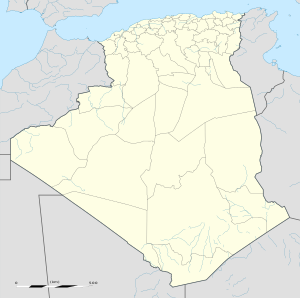El Kantara (El Kantara "الكنترة" word comes from Latin "Centuriation" (Derja: meaning a bridge) [1][2]) is a town and commune in Biskra Province, Algeria. The 1911 Baedeker travel guide described it as "one of the most important caravan-stations in E. Algeria." The town is well known for the eponymous gorge nearby, described by locals as the "Mouth of the Desert".[3]
El Kantara القنطرة | |
|---|---|
 | |
 | |
| Coordinates: 35°13′00″N 5°42′37″E / 35.2166°N 5.7104°E | |
| Country | |
| Province | Biskra Province |
| Time zone | UTC+1 (CET) |
The gorge is narrow, at only 40 metres (130 ft) wide, but the walls can be as high as 120 m (390 ft).[2]
History
editRoman soldiers of the Third Augustan Legion dubbed the gorge Calceus Herculis (English: Hercules' Kick), in reference to the divine hero Hercules' legendary strength.[2] They also constructed an arched bridge over the river in the bottom of the gorge, in order to allow caravans and military supplies to pass through the town with ease.[2]
In the second century A.D., the town and bridge were guarded by Syrian archers who are thought to have planted the first date palm grove in the region.[2]
Present infrastructure
editA highway and railroad follow the same path as the ancient Roman road through the town.[2]
Notable people
edit- Saïd Chengriha, senior military leader
Gallery
edit-
above the Roman bridge in Katara Gorge
-
below the bridge
-
El Kantara
References
edit- ^ "صول الزراعة في بلاد المغرب القديم" (PDF).
- ^ a b c d e f Scheffel, Richard L.; Wernet, Susan J., eds. (1980). Natural Wonders of the World. United States of America: Reader's Digest Association, Inc. pp. 197–198. ISBN 0-89577-087-3.
- ^ "The Ravine, I, El Cantara, Algeria". World Digital Library. 1899. Retrieved 2013-09-26.
External links
edit- Images of El-Kantara (including bridge and mosque) in Manar al-Athar digital heritage photo archive resource
35°13′31″N 5°42′23″E / 35.22528°N 5.70639°E
Les grandes Familles d'origine Arabe d'El Kantara sont : ABDELAZIZE, BELLAL, HOUFANI, KHIREDDINE, SAADLAOUD, SOURI, YOUB et ZEROUG. Le reste des familles sont d'origine Berbère.
